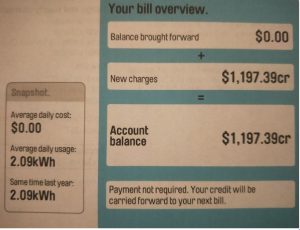“The most expensive kilowatt hour (kWh) of electricity is the one you didn’t need to pay for in the first place”, and unfortunately you may well be paying for much more than you know.
At some stage in our lives most of us have experience an oversupply of groceries go off in our fridge. Starting out with good intentions we over purchase and unfortunately the “Best By” dates arrive and become small dots in the revision mirror before we get around to adopting that healthy diet that we plan to indulge in.
After the event, a quick scan in the refrigerator visibly displays the extent of the carnage and the folly of our presumption is exposed. The sight of the event and the joy of having to deal with the ordeal make us wiser and we avoid over purchasing perishables, at least until the next time.
Energy and vegetables live in totally different worlds.
Wasted kWh’s do not slowly decay in the bottom of the crisper so the wasted energy is not always that obvious. That is, there is no rotting corpse for the police to discover. Most people would be a wakeup to going on a 3 month world trip and leaving the hot water system turned up to eleven, however those same wise people may leave “stepdown” transformers on all over the house or locate a fridge, even a commercial fridge, to be exposed to the midday sun. See pic 1.  Some things are known and some things are not known and the problem with this scenario is that you do not know what you do not know.
Some things are known and some things are not known and the problem with this scenario is that you do not know what you do not know.
A ” stepdown” transformer/power supply is more often found on, what people incorrectly refer to as a power lead. It’s that little rectangular box that is usually slightly warm to the touch and has the envious task of changing the grid based (Australian) 240 volt AC electricity supply into 9 volt DC or 6 volt DC supply or whatever strange voltage the company chooses so that you have to replace with overpriced genuine units that your computer or brand new electronic gadget is designed to use. These units are in every modern family home and the more modern your family appears, the more of these you have. Statistically speaking “power supplies” consume about 10% of a family’s electricity with no benefit to the family. I have dealt with one family, who were serious “gamers” leaving computer games on permanently or in “active standby” mode 24/7 who advised of a genuine reduction of 25% in their scheduled electricity bill by eliminating the waste. More detail on that here http://homeenergysecrets.com/ Click on the Mum’s and Dad’s Box bottom left.
After educating another family about how to stop this waste, they were told that that family did even better than them.
You don’t have to own a home to save on energy. People who rent or anyone who pays a monthly or 3 monthly bill can discover the tricks and develop the habits of those with an energy efficiency mindset. Our quarterly notices show that we consistently use similar amounts of electricity at each time quarter throughout the year. For the last decade we have averaged pulling 3kWh or less of electricity each day from the grid. See Pic 2 (how consistent, 2.09 kWh averaged per day for two years in a row. Consistent down to 1/100th of a kWh AND look at what was deposited into our bank account) Yes we do have solar which reduces our draw through the day but my wife is a “neat freak” and she vacuums when the sun is shining. If we can live as abundantly as we do on less than 6kWh or even 5kWh per day, how is that possible when the average Australian uses slightly over 18kWh per day. Americans statistically use a daily average of 28.9 kWh per day per household? If you live in an area that has extreme temperature fluctuations then consider putting in the effort to know how you benefit from better electrical habits. The link above shows how significantly better we do than what I refer to “the house next door” does with very little effort from us. It’s better for everyone to spend less on energy (except for the energy resellers) and its better for the land. If Australians drew only 5 kWh’s or 6kWh’s of energy from the grid each day instead of the average 18kWh’s per day, our demand for household electrical energy would be reduced nationally by more than 66%.
Yes we do have solar which reduces our draw through the day but my wife is a “neat freak” and she vacuums when the sun is shining. If we can live as abundantly as we do on less than 6kWh or even 5kWh per day, how is that possible when the average Australian uses slightly over 18kWh per day. Americans statistically use a daily average of 28.9 kWh per day per household? If you live in an area that has extreme temperature fluctuations then consider putting in the effort to know how you benefit from better electrical habits. The link above shows how significantly better we do than what I refer to “the house next door” does with very little effort from us. It’s better for everyone to spend less on energy (except for the energy resellers) and its better for the land. If Australians drew only 5 kWh’s or 6kWh’s of energy from the grid each day instead of the average 18kWh’s per day, our demand for household electrical energy would be reduced nationally by more than 66%.
I think that is worth considering. My family has been in that mindset and practice for decades and we miss out on nothing.
I encourage you to have a think about it.
Get your FREE copy of “Savvy Up and Save” here >>>LEARN MORE>>>
Moreton Bay residents can access weekly tips from John on Community Radio 101.5 FM Friday Mornings at 10:10am
John Lynn
